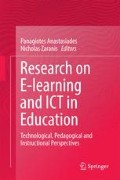Abstract
It is well known that meaningful ICT implementation in the classroom is still a challenge while teacher professional development is often seen as an important part of the solution. In this article, we present the design, implementation, and assessment of a small professional development intervention for promoting deeper ICT integration in the classrooms. The intervention combined good practices of teacher professional development with the steps of transformative learning in Mezirow’s theory of transformative learning. It was centered around the adaptation with minimal change of a research-based learning environment (RBLE) that was designed in a different national context. The intervention was successful in bringing forth critical reflection and reflective dialogue habits of mind of the participants that are relevant to teaching with ICT. However, the higher steps of Mezirow’s theory with respect to teacher and researcher roles were not realized.
Access this chapter
Tax calculation will be finalised at checkout
Purchases are for personal use only
References
Akerlof, G. A., & Dickens, W. T. (1982). The economic consequences of cognitive dissonance. The American economic review, 307–319.
Avalos, B. (2011). Teacher professional development in teaching and teacher education over ten years. Teaching and Teacher Education, 27(1), 10–20.
Baumgartner, L. M. (2001). An update on transformational learning. New Directions for Adult and Continuing Education, 2001(89), 15–24.
Becker, H. J. (2000). Findings from the teaching, learning, and computing survey: Is larry cuban right? Education Policy Analysis Archives, 8(51), 1–35.
Brown, A. L., & Campione, J. C. (1996). Psychological theory and the design of innovative learning environments: On procedures, principles, and systems. Lawrence Erlbaum Associates, Inc.
Cuban, L. (2001). Oversold and underused. Computers in the classroom. Cambridge: Harvard University Press.
Chi, M. T., & VanLehn, K. A. (2012). Seeing deep structure from the interactions of surface features. Educational Psychologist, 47(3), 177–188.
Chi, M. T., Feltovich, P. J., & Glaser, R. (1981). Categorization and representation of physics problems by experts and novices. Cognitive Science, 5(2), 121–152.
Desimone, L. M. (2009). Improving impact studies of teachers’ professional development: Toward better conceptualizations and measures. Educational Researcher, 38(3), 181–199.
Desimone, L. M., & Garet, M. S. (2016). Best practices in teachers’ professional development in the United States. Psychology, Society, & Education, 7(3).
Duit, R., & Treagust, D. F. (2012). How can conceptual change contribute to theory and practice in science education?. In Second International Handbook of Science Education (pp. 107–118). Netherlands: Springer.
Ertmer, P. A. (2005). Teacher pedagogical beliefs: the final frontier in our quest for technology integration? Educational Technology Research and Development, 53(4), 25–39.
Eteokleous, N. (2008). Evaluating computer technology integration in a centralized school system. Computers & Education, 51(2), 669–686.
Karasavvidis, I., & Kollias, V. (2014). Technology Integration in the most favorable conditions: Findings from a professional development training program. In Research on e-Learning and ICT in Education (pp. 197–224). New York: Springer.
Kensing, F., & Blomberg, J. (1998). Participatory design: Issues and concerns. Computer Supported Cooperative Work, 7, 167–185.
Kitchenham, A. (2008). The evolution of John Mezirow’s transformative learning theory. Journal of Transformative Education, 6(2), 104–123.
Konidari, V., & Abernot, Y. (2006). From TQM to learning organisation: Another way for quality management in educational institutions. International Journal of Quality & Reliability Management, 23(1), 8–26.
Kyza, E. A., Herodotou, C., Nicolaidou, I., Redfors, A., Hansson, L., Schanze, S., & Michael, G. (2014). Adapting web-based inquiry learning environments from one country to another: The CoReflect experience. In Topics and Trends in Current Science Education (pp. 567–582). Netherlands: Springer.
Mayring, P. H. (2004). Qualitative content analysis. In U. Flick, E. von Kardorff, & I. Steinke (Eds.), A companion to qualitative research (pp. 266–269).
Mezirow, J. (1997a). Cognitive processes: contemporary paradigms of learning. In Adult learning: A reader. Kogan Page: Sterling, VA.
Mezirow, J. (1997b). Transformative learning: Theory to practice. New Directions for Adult and Continuing Education, 1997(74), 5–12.
Mezirow, J. (2003). Transformative learning as discourse. Journal of Transformative Education, 1(1), 58–63.
Mezirow, J. (2009). An overview on transformative learning. In K. Illeris (Ed.), Contemporary theories of learning: Learning theorists… In Their Own Words, vol. 90.
Patiniotis, N., & Stavroulakis, D. (1997). The development of vocational education policy in Greece: A critical approach. Journal of European Industrial Training, 21(6/7), 192–202.
Player-Koro, C. (2012). Hype, hope and ICT in teacher education: A Bernsteinian perspective. Learning, Media and Technology, 38(1), 26–40.
Postholm, M. B. (2012). Teachers’ professional development: A theoretical review. Educational Research, 54(4), 405–429.
Steiner, G. (1998). After babel: Aspects of language and translation. Oxford: Oxford University Press.
Thomas, G., Wineburg, S., Grossman, P., Myhre, O., & Woolworth, S. (1998). In the company of colleagues: An interim report on the development of a community of teacher learners. Teaching and Teacher Education, 14, 21–32.
Van der Meij, H., Post, T., Velthorst, G., Barnhoorn, H. A., & Marell, J. (2011). My house on the moon. [Teacher manual]. Retrieved from http://www.coreflect.org.
Vosniadou, S., & Mason, L. (2012). Conceptual change induced by instruction: A complex interplay of multiple factors.
Acknowledgments
This work was funded by the “Science in Society” Initiative of the Seventh Framework Research Programme (FP7) of the European Community, under the CoReflect grant (217792) coordinated by the Cyprus University of Technology. Opinions, findings, and conclusions are those of the authors and do not necessarily reflect the views of the funding agency.
Author information
Authors and Affiliations
Corresponding author
Editor information
Editors and Affiliations
Rights and permissions
Copyright information
© 2017 Springer International Publishing Switzerland
About this chapter
Cite this chapter
Kollias, V., Davaris, A., Daropoulos, A., Zaganas, K. (2017). Using a Research-Based Learning Environment’s Appropriation, as the Context for a Professional Development Intervention in ICT Integration in the Classroom. In: Anastasiades, P., Zaranis, N. (eds) Research on e-Learning and ICT in Education. Springer, Cham. https://doi.org/10.1007/978-3-319-34127-9_5
Download citation
DOI: https://doi.org/10.1007/978-3-319-34127-9_5
Published:
Publisher Name: Springer, Cham
Print ISBN: 978-3-319-34125-5
Online ISBN: 978-3-319-34127-9
eBook Packages: EducationEducation (R0)

